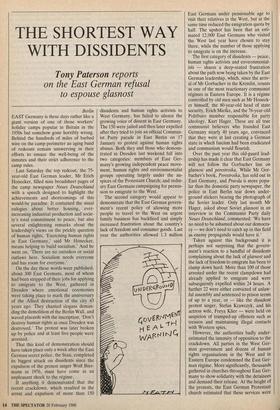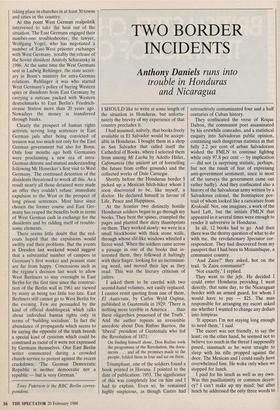THE SHORTEST WAY WITH DISSIDENTS
Tony Paterson reports
on the East German refusal to espouse glasnost
Berlin EAST Germany is these days rather like a giant version of one of those workers' holiday camps popular in Britain in the 1950s but somehow gone horribly wrong. Behind the hundreds of miles of barbed wire on the camp perimeter an aging band of redcoats remain unswerving in their efforts to ensure the well-being of the inmates and their strict adherence to the camp rules.
Last Saturday the top redcoat, the 75- year-old East German leader, Mr Erich Honecker, filled nine broadsheet pages of the camp newspaper Neues Deutschland with a speech designed to highlight the achievements and shortcomings of this would-be paradise. It contained the usual eulogies about better housing, ever- increasing industrial production and socie- ty's total commitment to peace, but also several enlightening remarks about the leadership's views on the prickly question of human rights. 'Exercising human rights in East Germany,' said Mr Honecker, means helping to build socialism.' And he went on, 'There are no outsiders or social outlaws here. Socialism needs everyone and has room for everyone.'
On the day these words were published, about 300 East Germans, most of whom had been stripped of their jobs for applying to emigrate to the West, gathered in Dresden where emotional ceremonies were taking place to mark the anniversary of the Allied destruction of the city 43 years ago. They chanted slogans deman- ding the demolition of the Berlin Wall, and waved placards with the inscription, 'Don't destroy human rights as once Dresden was destroyed.' The protest was later broken up by police and at least five people were arrested.
That this kind of demonstration should have taken place only a week after the East German secret police, the Stasi, completed its biggest attack on dissidents since the expulsion of the protest singer Wolf Bier- mann in 1976, must have come as an unpleasant shock to the regime.
If anything it demonstrated that the recent crackdown, which resulted in the arrest and expulsion of more than 150 dissidents and human rights activists to West Germany, has failed to silence the growing voice of dissent in East Germany. The 150 were jailed and then later, expelled after they tried to join an official Commun- ist Party parade in East Berlin on 17 January to protest against human rights abuses. Both they and those who demons- trated in Dresden last weekend fall into two categories: members of East Ger- many's growing independent peace move- ment, human rights and environmentalist groups operating largely under the au- spices of the Protestant Church; and ordin- ary East Germans campaigning for permis- sion to emigrate to the West.
The second category would appear to demonstrate that the East German govern- ment's recent policy of allowing more people to travel to the West on urgent family business has backfired and simply increased frustration about the country's lack of freedom and consumer goods. Last year the authorities allowed 1.3 million East Germans under pensionable age to visit their relatives in the West, but at the same time reduced the emigration quota by half. The upshot has been that an 'esti- mated 12,000 East Germans who visited the West last year have chosen to stay there, while the number of those applying to emigrate is on the increase.
The first category of dissidents — peace, human rights activists and environmental- ists — shares a deep-seated frustration about the path now being taken by the East German leadership, which, since the arriv- al of Mr Gorbachev in the Kremlin, counts as one of the most reactionary communist regimes in Eastern Europe. It is a regime controlled by old men such as Mr Honeck- er himself, the 80-year-old head of 'state security, Erich Mielke, and the 76-year-old Politburo member responsible for party ideology, Kurt Hager. These are all true communist believers who founded East Germany nearly 40 years ago, convinced that they were at last creating a German state in which fascism had been eradicated and communism would flourish.
Over the past year this old-guard lead- ership has made it clear that East Germany will not follow the Gorbachev line on glasnost and perestroika. While Mr Gor- bachev's book, Perestroika, has sold out in East Germany, and Pravda is more popu- lar than the domestic party newspaper, the police in East Berlin tear down under- ground stickers bearing the photograph of the Soviet leader. Only last month Mr Hager, asked about Soviet glasnost in an interview' in the Communist Party daily Neues Deutschland, commented: 'We have no need to be ashamed about our democra- cy — we don't need to catch up in this field as enemy propaganda would have it.'
Taken against this background it is perhaps not surprising that the govern- ment's reaction to a handful of dissidents complaining about the lack of glasnost and the lack of freedom to emigrate has been to clamp down hard. More than 100 of those arrested under the recent clampdown had already applied to emigrate and were subsequently expelled within 24 hours. A further 22 were either convicted of unlaw- ful assembly and sentenced to prison terms of up to a year, or — like the dissident protest singer, Stefan Krawczyk, and his actress wife, Freya Klier — were held on suspicion of trumped-up offences such as treason and maintaining illegal contacts with Western spies.
However, the authorities badly under- estimated the intensity of opposition to the crackdown. All parties in the West Ger- man government and dozens of human rights organisations in the West and in Eastern Europe condemned the East Ger- man regime. More significantly, thousands gathered in churches throughout East Ger-. many to show solidarity with the detainees and demand their release. At the height of the protests, the East German Protestant church estimated that these services were taking place in churches in at least 30 towns and cities in the country.
At this point West German realpolitik intervened to take the heat out of the situation. The East Germans engaged their number-one troubleshooter, the lawyer, Wolfgang Vogel, who has negotiated a number of East-West prisoner exchanges with West Germany, notably the release of the Soviet dissident Anatoly Scharansky in 1986. At the same time the West Germans sent in Ludwig Rehlinger, the state secret- ary in Bonn's ministry for intra-German relations. Rehlinger it was who started West Germany's policy of buying Western spies or dissidents from East Germany by carrying a suitcase packed with Western deutschmarks to East Berlin's Friedrich- strasse Station more than 20 years ago. Nowadays the money is transferred through banks.
Clearly the prospect of human rights activists serving long sentences in East German jails after being convicted of treason was too much not only for the East German government but also for Bonn. Only four months ago both Germanies were proclaiming a new era of intra- German détente and mutual understanding following Mr Honecker's first visit to West Germany. The continued detention of the dissidents threatened to wreck all this. As a result nearly all those detained were made an offer they couldn't refuse: immediate expulsion to the West or the prospect of long prison sentences. Most have since chosen the former course and East Ger- many has reaped the benefits both in terms of West German cash in exchange for the dissidents and by ridding itself of trouble- some elements.
There seems little doubt that the red- coats hoped that the expulsions would swiftly end their problems. But the events in Dresden last weekend would suggest that a substantial number of campers in Germany's first worker and peasant state are far from happy. Concessions such as the regime's decision last week to allow West Berliners to stay overnight in East Berlin for the first time since the construc- tion of the Berlin wall in 1961 are viewed by many as being too little too late. East Berliners still cannot go to West Berlin for the evening. Few are persuaded by the kind of official doublespeak which talks about individual human rights only in terms of 'building socialism'. In fact the abundance of propaganda which seems to be saying the opposite of the truth breeds a special kind of cynicism which could be construed as racist of it were not expressed by Germans themselves. One East Berlin writer commented during a crowded church service to protest against the recent crackdown: 'The German Democratic Republic is neither democratic nor a republic — but is very German.'



















































 Previous page
Previous page